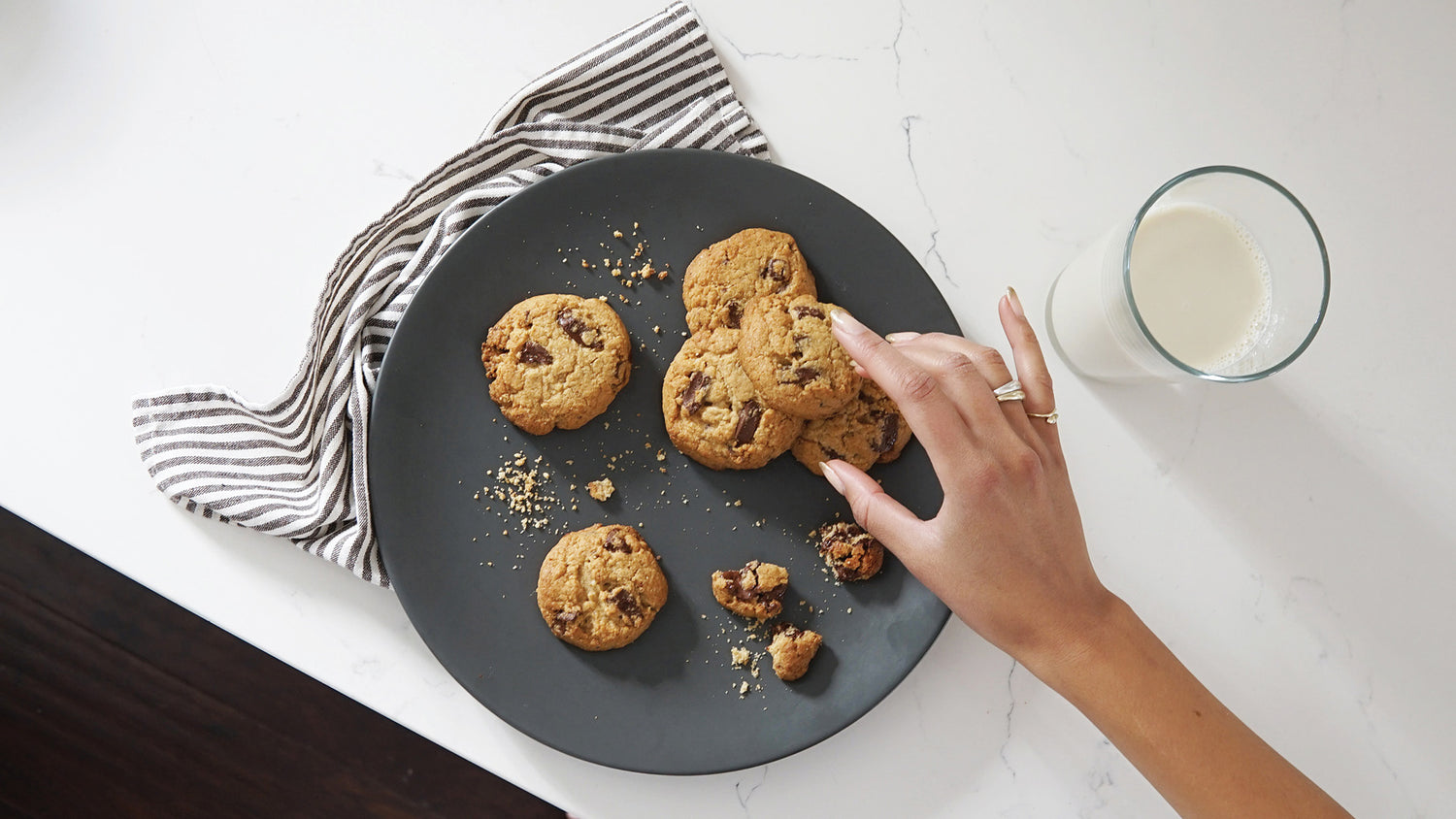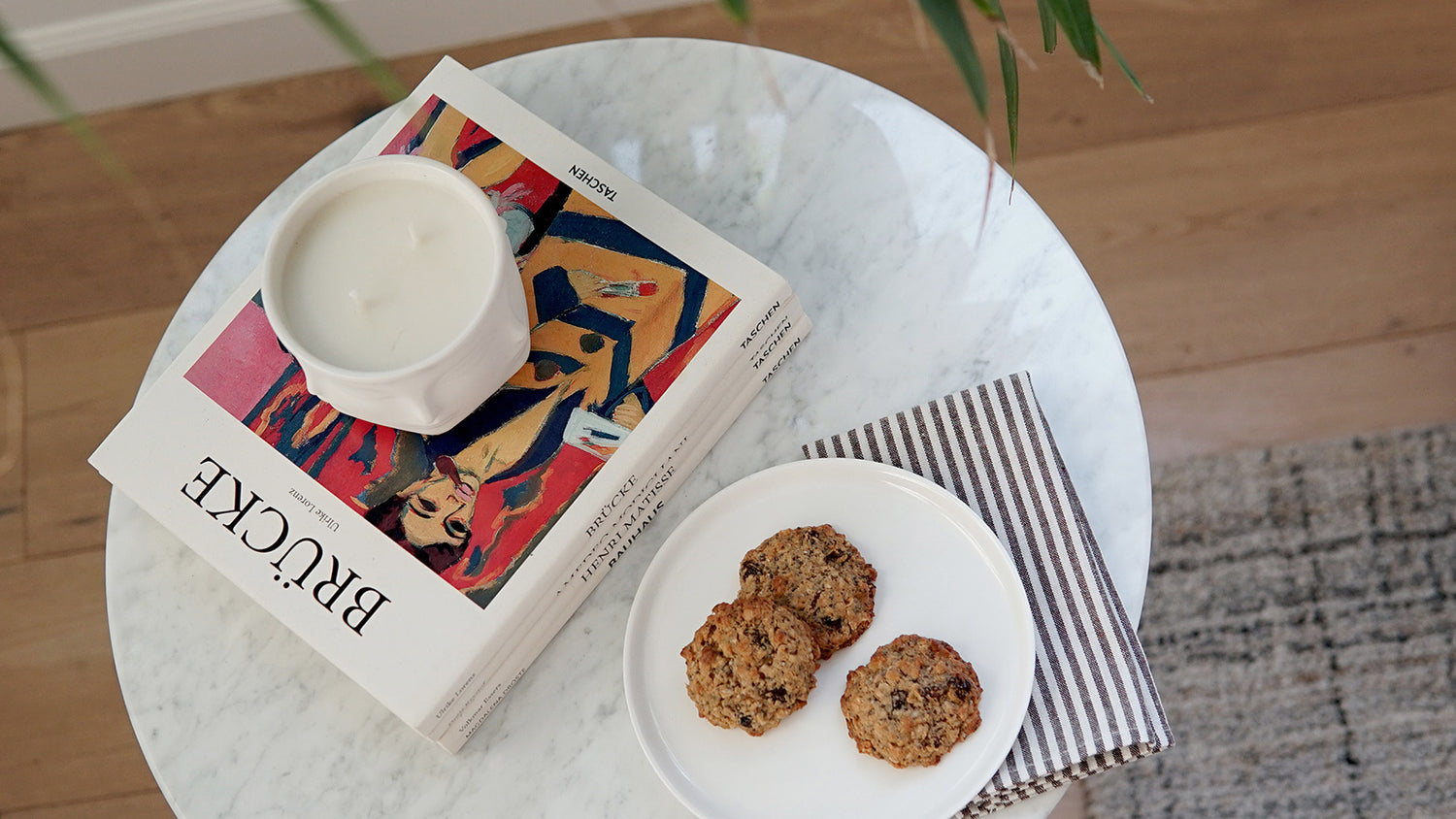Frequently Asked Questions
INGREDIENTS & BENEFITS
WHAT IS A GALACTAGOGUE AND HOW DO THEY WORK?
Galactagogues are substances used to induce, maintain, and stimulate milk production.
The word stems from the Greek word “gala” which means “milk”. Galactagogues can include herbs, foods and medications.
Galactagogues work in different ways. Some work by stimulating hormones related to breastfeeding, while others supply key calories, nutrients and vitamins essential to breastfeeding. Though few scientific studies have been dedicated to food-based galactagogues, many foods have traditionally been used in different cultures and recommended by doctors and lactation consultants due to anecdotal evidence. The only study that looked at lactation cookies did not measure breastmilk quantities, but participants did rate cookies as being “moderately effective” at increasing their supply.
It is important to note that the primary way to stimulate lactation is by increasing breast emptying by either direct feeding or pumping. It is also important to maintain a balanced diet, adequate calories, and ample hydration. However, many women still seek to augment their production and support their breastfeeding with the use of galactagogues.
What galactagogues are featured in Taste Chérie cookies?
ORGANIC OAT FLOUR
Oats and oatmeal contain a good balance of protein, carbohydrates and dietary fiber. Some of the fiber in oats includes beta-glucan, which is felt to augment prolactin, a key hormone in the production and maintenance of breastmilk. Studies showed that augmenting beta-glucan in the diet of cows increased their milk production. Oats are rich in soluble fiber, which has other health benefits for the post-partum mom, like relieving constipation and maintaining gut health, as well as maintaining fullness and preventing sugar spikes. Oats are also nutrient-rich with vitamins and minerals that support postpartum and breastfeeding mothers, as well as the breastfeeding infant, including vitamin B6, vitamin E, calcium, zinc, iron, folate, iodine and magnesium
BREWERS YEAST
Brewers yeast is also known as Saccharomyces cervisiae. Brewers yeast contains protein, B-complex vitamins, selenium, iron, magnesium and chromium. Not to be confused with nutritional yeast, Brewers yeast has been used traditionally to stimulate milk production. Some studies also suggest additional benefits like reduced cholesterol and more balanced sugar levels.
ORGANIC FLAXSEED MEAL
Flaxseed meal is ground flaxseed and serves as a good source of fiber and protein, omega-3 fatty acids, as well as micronutrients like magnesium, calcium, zinc, copper and selenium. As with oats, the fiber in flaxseed can help promote gut health. But uniquely, flaxseeds are rich in ALA (alpha-linolenic acid), an essential fatty acid that is converted into DHA (docosahexaenoic acid) and EPA (eicosapentaenoic acid). Nursing mothers and their breastfed infants need these types of omega-3 fatty acids for growth and development. Flaxseed also contains lignans, micronutrients that are known as “phytoestrogens.” These plant-based estrogen precursors are thought to act similar to the body’s own estrogen and hence may help augment the production of prolactin and breastmilk.
CHIA SEEDS
(in our Chia Oatmeal Raisin cookie)
Chia seeds are a great source of fiber, protein, omega-3 fatty acids and minerals like calcium, phosphorus, copper, selenium, iron and magnesium. Like flaxseed, chia seeds contain ALA (alpha-linoleic acid), which is an omega-3 fatty acid that is important for growth and development.
Can you tell me more about the different micronutrients in Taste Chérie's cookies?
TASTE CHÉRIE MICROINGREDIENTS
- Iron can help with postpartum anemia.
- Thiamine (aka Vitamin B1) is important for brain and immune system development. Studies show that levels in milk correlate to levels that the mom ingests.
- Riboflavin (aka vitamin B2) helps metabolism and growth. Studies show riboflavin in breast milk correlates with maternal dietary intake
- Folate (aka vitamin B9) is essential for cell function and DNA. Studies show that increased folate intake increases folic acid in breast milk.
- Iodine is important for cognitive and metabolic function. Studies show that iodine levels in milk correlate with maternal dietary intake.
- Choline is important in cellular development, brain development and immune function. Choline in diet supports levels of choline in breastmilk to help with baby development, and also supports the immune system in the postpartum mother.
- Zinc, Calcium and Magnesium intake does not alter levels in breast milk, but does support postpartum health. Zinc and magnesium have been shown to improve healing and decrease postpartum depression, and zinc has essential roles in the mammary glands. Calcium increases bone density and reduces the amount of bone loss related to breastfeeding.
- Omega-3-fatty acids like ALA, DHA and EPA are core precursors in growth and development. Studies show that higher intake of ALA (such as in flaxseed) while breastfeeding, leads to higher levels of ALA and EPA in the breastmilk. And in term infants, ALA supplementation was associated with increased weight and length at one year of age.
MORE RESOURCES:
Beta glucan and milk production: https://pubmed.ncbi.nlm.nih.gov/33360572/
Iodine rich foods improve iodine levels in breastmilk: https://pubmed.ncbi.nlm.nih.gov/35222600/
Importance of choline in mother and baby: https://www.ncbi.nlm.nih.gov/pmc/articles/PMC5537828/#:~:text=Choline%20is%20an%20essential%20micronutrient,and%20intestinal%20health%20%5B3%5D.
Overview of nutrients in human breast milk: https://www.ncbi.nlm.nih.gov/pmc/articles/PMC6008960/
Breastfeeding and galactagogue use in South Africa:
http://www.sajog.org.za/index.php/SAJOG/article/view/1116/556
ALA (omega-3-fatty acids) supplementation in infants:
https://pubmed.ncbi.nlm.nih.gov/15825825/
CDC guidance on maternal diet and micronutrients in breastfeeding: https://www.cdc.gov/breastfeeding/breastfeeding-special-circumstances/diet-and-micronutrients/index.html
How many cookies do you recommend per day to help boost supply?
Breastmilk quantity depends on many factors including a balanced diet, ample hydration and frequent breast emptying. In addition, every body is different. But most people who enjoy our cookies should see an increase in supply by enjoying at least 2-3 cookies daily.
Should I consult my doctor before including these cookies in my diet?
At Taste Chérie we stand behind the quality and integrity of our products, but we always recommend that individuals who are pregnant or breastfeeding consult with their physician or medical provider before using our, or any other, new product.
Your health is of utmost importance, and personalized advice from a healthcare professional ensures that you can make informed decisions that align with your unique circumstances.
Can anyone enjoy these cookies, or are they only for breastfeeding moms?
Absolutely! Our cookies are made from organic, natural ingredients that are generally safe for consumption, excluding any allergies.
The primary galactagogues, including oats, brewer's yeast, flaxseed and chia, target systems that support lactation in nursing mothers, but act simply as a good source of fiber, nutrients and vitamins in non-lactating people. So, while they are specially formulated to support lactation, they're still a delightful treat for anyone to enjoy.
That means you, your partner, your child, or even your nanny can savor our cookies without any worries. Just a word of caution: be careful who you share them with, as they might find themselves coming back for more of these irresistible goodies!
COOKIE PREP & STORAGE
I do not own a cookie scoop. How much is 1 oz?
A 1 oz sized cookie scoop holds approximately two tablespoons of dough.
What vegan substitutions do you recommend to replace butter and eggs?
We know that many people choose to follow dairy-free or vegan lifestyles and that many families deal with certain allergies. To this end, we developed our mix to accommodate various dietary preferences:
- To substitute butter:
Use 1/2 cup of melted coconut oil.
- To substitute 1 egg:
Make 1 flax egg out of 1 Tbsp ground flaxseed meal and approximately 3 Tbsp warm water,
OR
Use 1 ripe smashed banana.
How do you recommend reheating cookies?
There is nothing quite as comforting as a warm cookie! We suggest reheating cookies individually in the oven at 350F for a few minutes, or or 10-15 seconds in a microwave until warmed to your liking.
How are cookies best stored once prepared?
We recommend that if you are not enjoying cookies right away, that you let them cool first and then store in an airtight container or ziplock bag at room temperature, to be enjoyed in the next week.
To freeze baked cookies for future use, allow cookies to cool, then place in a freezer-safe bag. To enjoy, remove desired quantity from freezer and allow to defrost at room temperature.
If you wish to mix and freeze cookie dough ahead of baking, roll prepared dough into a log, wrap in plastic wrap or waxed parchment paper, and place in a freezer-safe bag. When ready to use, remove from freezer and allow to defrost at room temperature before dividing into 1 oz portions and baking. Alternatively, you can freeze pre-scooped 1 oz portions of cookie dough in a freezer-safe bag. Allow these to defrost prior to baking.
SHIPPING & RETURNS
What are your Shipping Policies?
We offer free shipping for product purchases over $75.00 with code "TCSHIPFREE". Otherwise, we offer Standard Shipping (3-5 business days) at $7.99 or Express Shipping (2 business days) at $11.99.
Orders placed by 9AM PT Mon-Fri are processed the same day; orders placed Sat-Sun are processed the following Monday. Please note, shipping estimates are calculated once orders are processed, and may be subject to carrier delays.
We do not offer international shipping at this time.
If you encounter any issues with shipping, such as not receiving your package or damage to the package or contents, we invite you to email us directly at support@tastecherie.com and we will try our best to resolve it in a timely manner.
What are your Return Policies?
As a small business, and given the perishable nature of our product, we cannot accept returns.
We stand behind the taste and quality of our cookie mixes. However, if you are not satisfied for any reason, please email us at support@tastecherie.com so that we can work with you to find a solution.
How Do I recycle my Taste Chérie pouches?
Yes, our pouches are recyclable via Store Drop-Off.
Many retailers have Store Drop-Off collection bins at the front of their stores, including Target, Publix, Walmart, Albertsons, and Wegmans! To find a Store Drop-Off location near you, visit How2Recycle
Can't find what you're looking for? Let's Chat.
Send us an email, tell us what's up, and someone from our Customer Service team will get back to you. Please include as many details about your order as possible so we can resolve in a timely manner.
Please email us at support@tastecherie.com



